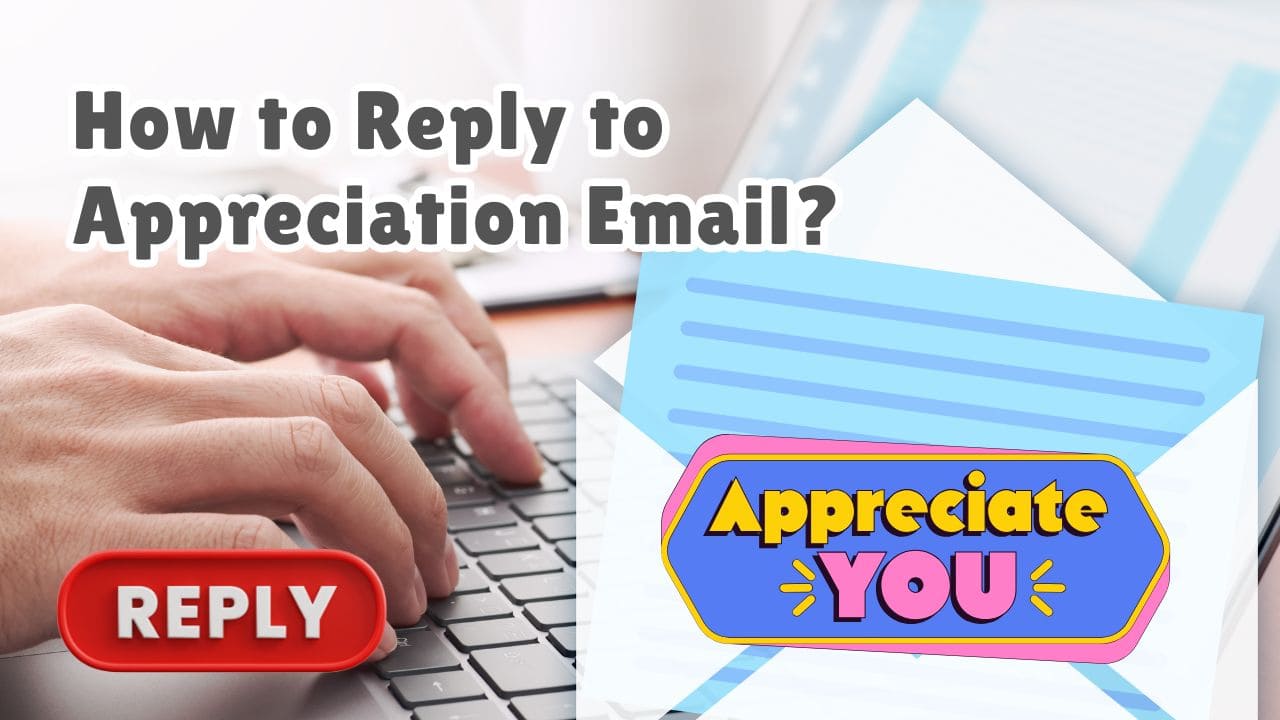Gratitude letters are important when they perform the functions of reciprocating and reinforcing beneficial relations in workplace settings. It is also the right response to bestow compliments, express appreciation and support future interactions. Here is a comprehensive description of the procedures involved in replying to gratitude letters, including lists, templates, and conventional responses. Learn how to reply to appreciation emails through gratitude words and phrases and best practices.
Why Respond to Appreciation Emails?
- Acknowledgment: It shows that you value the sender’s recognition.
- Relationship Building: A thoughtful response can strengthen professional relationships.
- Encouragement: It motivates both you and the sender to continue positive interactions.
Key Components of a Response for Appreciation Email
- Gratitude: Start with a sincere thank you.
- Acknowledgment: Recognize specific contributions or qualities mentioned.
- Connection: Reinforce your relationship with the sender.
- Personalization: Tailor your message to the specific context.
- Professionalism: Maintain a professional tone throughout.
- Humility: Accept praise graciously without boasting.
- Future Engagement: Express openness to continued collaboration.
How to Reply to Appreciation Email – Follow Steps given below
Step #1. Acknowledge the Appreciation
- Begin by thanking the sender for their kind words.
Step #2. Express Your Gratitude
- Clearly state what you are grateful for and how it impacts you.
Step #3. Mention the Impact
- If relevant, discuss how their appreciation motivates you or enhances your work.
Step #4. Keep It Brief
- Aim for a concise response; a few sentences are usually sufficient.
Step #5. Close Professionally
- Use a polite closing that invites future interaction.
Unique ways to – Start a Thank-You Email
Starting a thank-you email with a unique and engaging opening can set a positive tone and make your message stand out. Here are some creative ways to begin your thank-you emails, along with examples to illustrate how they can be used effectively.
1. “I hope this message finds you well!”
- A friendly and warm opener that shows you care about the recipient’s well-being.
- Example: “I hope this message finds you well! I wanted to take a moment to express my gratitude for your support during the project.”
2. “I’m writing to express my heartfelt thanks for…”
- This phrase adds a personal touch and emphasizes the sincerity of your appreciation.
- Example: “I’m writing to express my heartfelt thanks for your invaluable guidance throughout the project.”
3. “Your assistance made a significant difference!”
- This acknowledges the impact of their help right from the start.
- Example: “Your assistance made a significant difference in my ability to meet the deadline, and I truly appreciate it.”
4. “I wanted to reach out and say thank you!”
- A straightforward yet effective way to convey your intention.
- Example: “I wanted to reach out and say thank you for taking the time to meet with me last week.”
5. “It was wonderful to connect with you!”
- Great for follow-ups after meetings or networking events.
- Example: “It was wonderful to connect with you at the conference! Thank you for sharing your insights.”
6. “I can’t express how much I appreciate your help!”
- This phrase conveys deep gratitude right from the beginning.
- Example: “I can’t express how much I appreciate your help with my recent presentation; it truly made a difference.”
7. “Thank you so much for your support!”
- A classic opener that is both polite and appreciative.
- Example: “Thank you so much for your support during this challenging period; it means a lot to me.”
8. “Your generosity is greatly appreciated!”
- Suitable when someone has gone out of their way to assist you.
- Example: “Your generosity is greatly appreciated! Thank you for sharing your resources with me.”
9. “I sincerely appreciate your time and effort!”
- Acknowledges both their time and contributions.
- Example: “I sincerely appreciate your time and effort in helping me navigate this project.”
10. “Thank you for being such a great mentor!”
- Perfect for expressing gratitude towards someone who has provided guidance or support.
- Example: “Thank you for being such a great mentor; your advice has been invaluable in my career development.”
Additional Tips
- Personalize Your Opening: Tailor your greeting based on your relationship with the recipient, using their name or mentioning specific interactions.
- Be Genuine: Ensure that your opening reflects true feelings of gratitude; authenticity resonates more than generic phrases.
- Keep It Professional: Maintain an appropriate tone based on your relationship, whether formal or informal.
Using these unique openings can help make your thank-you emails more engaging and memorable, fostering positive relationships in both professional and personal contexts.
Templates for Responding to Appreciation Emails
Template 1: Simple Acknowledgment
Subject: Thank You!
Dear [Sender's Name],
Thank you for your thoughtful email. Your words of appreciation truly mean a lot to me, and I'm glad I could contribute positively.
Best regards,
[Your Name]Template 2: Acknowledgment with Encouragement
Subject: Re: Appreciation for Project Contribution
Dear [Sender's Name],
I’m delighted to hear that my contribution was valuable! Your recognition inspires me to continue giving my best efforts. Let’s keep up the momentum together!
Warm regards,
[Your Name]Template 3: Response After a Job Interview
Subject: Thank You for Your Kind Words
Dear [Interviewer's Name],
Thank you for your kind email following our interview. I appreciate the opportunity to discuss my potential contributions to [Company Name]. Your feedback reinforces my enthusiasm for the role.
Please let me know if you need any more information from my side.
Warm regards,
[Your Name]Template 4: Response to a Client
Subject: Thank You!
Hi [Client’s Name],
Thank you for your appreciative note! I’m thrilled that you were satisfied with our recent collaboration on [specific project]. Your feedback is invaluable, and I look forward to continuing our partnership.
Best,
[Your Name]Template 5: Response to a Colleague
Subject: Re: Thanks!
Hey [Colleague’s Name],
Thank you for your kind words! It’s great working with such an amazing team, and I appreciate your support throughout our project. Looking forward to our next steps together!
Cheers,
[Your Name]Best practices for responding to an Appreciation Email
- Be Prompt: Aim to respond within 24 hours.
- Use Appropriate Subject Lines: Keep it relevant by using the existing thread’s subject line.
- Maintain a Positive Tone: Keep your language friendly and upbeat.
- Personalize Your Message: Reference specific points from the original email.
- Invite Further Interaction: Encourage ongoing communication or collaboration.
Common scenarios and sample replies to appreciation emails
Scenario 1: Colleague Appreciation
Hi [Colleague's Name],
Thank you for your kind words about my presentation! I’m glad it resonated with you and the team. Your support means a lot, and I look forward to collaborating on future projects!
Best,
[Your Name]Scenario 2: Client Feedback
Dear [Client's Name],
Thank you so much for your feedback! I’m thrilled that our work met your expectations. It’s always a pleasure working with you, and I look forward to our next project together!
Warm regards,
[Your Name]Scenario 3: Manager Recognition
Subject: Thank You!
Dear [Manager's Name],
I sincerely appreciate your recognition of my work on [specific project]. Your support motivates me to strive for excellence in all my tasks. Thank you once again!
Best regards,
[Your Name]Following such guidelines, using handpicked templates, and employing the professional practices would allow you to have constructive responses towards appreciation related emails making sure that professional relationships improve or strengthen with the employees in the organization’s work setting.
Expressing gratitude in a thank-you email can significantly enhance your professional relationships and create a positive impression. Here are some creative ways to convey your appreciation effectively, along with templates and examples.
Creative ways to express gratitude while replying to Appreciation email from boss or client
1. Personalize Your Message
- Tailor your email to the specific action or support you received. Mention details that show you were genuinely impacted by their help.
2. Use Unique Phrases
- Instead of the standard “thank you,” consider using variations that convey deeper appreciation:
- “I’m incredibly grateful for your support.”
- “Your assistance made a significant difference.”
- “I truly appreciate your guidance.”
3. Incorporate a Compliment
- Compliment the recipient on their skills or qualities. This not only expresses gratitude but also acknowledges their strengths.
- “Your expertise in [specific area] is invaluable.”
- “I admire how you handled [specific situation].”
4. Share the Impact
- Explain how their help has positively affected you or your work. This adds depth to your gratitude.
- “Thanks to your advice, I was able to successfully complete the project ahead of schedule.”
- “Your feedback helped me refine my presentation, making it much more effective.”
5. Add a Personal Touch
- Include a personal note or anecdote related to your interaction. This makes your email feel more genuine.
- “I enjoyed our conversation about [topic]; it gave me new insights.”
6. Use Humor (When Appropriate)
- A light-hearted comment can make your email memorable, as long as it suits the relationship you have with the recipient.
- “I owe you a coffee for all the help you’ve given me!”
7. Include a Quote or Saying
- A relevant quote can enhance your message and resonate with the recipient.
- “As they say, ‘Gratitude is not only the greatest of virtues but the parent of all others.’ Thank you for embodying this!”
8. Invite Future Interaction
- Encourage ongoing communication or collaboration, showing that you value their input.
- “I look forward to working together again soon!”
Unique Phrases to Use in a Thank-You Email
1. “I truly appreciate your support.”
- This phrase conveys sincerity and acknowledges the recipient’s help.
- Example: “I truly appreciate your support during the project; it made a significant difference.”
2. “Your assistance has been invaluable.”
- This emphasizes the importance of their help.
- Example: “Your assistance has been invaluable in navigating this complex situation.”
3. “I’m grateful for your guidance.”
- Use this when someone has provided mentorship or advice.
- Example: “I’m grateful for your guidance throughout this process; it has been instrumental to my success.”
4. “Thank you for going above and beyond.”
- Acknowledges extra effort and commitment.
- Example: “Thank you for going above and beyond to ensure our project was successful.”
5. “I can’t thank you enough for your help.”
- This phrase expresses deep appreciation.
- Example: “I can’t thank you enough for your help with the presentation; it turned out great!”
6. “Your support means the world to me!”
- A more personal touch that conveys emotional gratitude.
- Example: “Your support means the world to me, especially during such challenging times.”
7. “I am indebted to you for your assistance.”
- This phrase indicates a strong sense of gratitude.
- Example: “I am indebted to you for your assistance in resolving the issue so quickly.”
8. “Your insights were incredibly helpful.”
- Acknowledges the value of their input or feedback.
- Example: “Your insights were incredibly helpful in shaping my approach to the project.”
9. “I sincerely appreciate your time and effort.”
- This shows respect for their commitment.
- Example: “I sincerely appreciate your time and effort in helping me prepare for the meeting.”
10. “Thank you for believing in me.”
- This phrase is particularly powerful in mentorship contexts.
- Example: “Thank you for believing in me and supporting my career growth.”
Additional Expressions of Gratitude
- “Heartfelt thanks for…”
- Use this when expressing deep appreciation.
- Example: “Heartfelt thanks for all the guidance you’ve provided over the years.”
- “Your generosity is greatly appreciated.”
- Perfect for thanking someone who has offered resources or support.
- Example: “Your generosity is greatly appreciated; it has made a significant impact on our team.”
- “Many thanks for your prompt response.”
- Acknowledge quick replies or actions.
- Example: “Many thanks for your prompt response; it helped us stay on track.”
- “I’m very thankful for your consideration.”
- Use this when someone has taken time to weigh options or decisions.
- Example: “I’m very thankful for your consideration regarding my proposal.”
- “Your feedback was enlightening.”
- Great for acknowledging constructive criticism or suggestions.
- Example: “Your feedback was enlightening, and I will incorporate it into my future work.”
Templates for Thank-You Emails
Template 1: General Appreciation
Subject: Thank You!
Hi [Recipient’s Name],
I wanted to take a moment to express my sincere gratitude for [specific action]. Your support has made a significant impact on my work, and I truly appreciate it.
Your expertise in [specific area] is invaluable, and I look forward to collaborating with you again soon!
Warm regards,
[Your Name]Template 2: After a Meeting
Subject: Great Meeting You!
Hello [Recipient’s Name],
Thank you for taking the time to meet with me on [date]. I really enjoyed our discussion about [specific topic] and found your insights incredibly helpful.
I appreciate your willingness to share your knowledge, and I look forward to implementing some of your suggestions!
Best,
[Your Name]Template 3: Feedback Appreciation
Subject: Thank You for Your Feedback!
Dear [Recipient’s Name],
I want to extend my heartfelt thanks for your valuable feedback on my recent project. Your suggestions helped me refine my approach and achieve better results.
I truly appreciate your support and look forward to applying what I've learned in future projects.
Sincerely,
[Your Name]Template 4: Client Appreciation
Subject: Thank You for Your Trust!
Hi [Client’s Name],
Thank you for choosing us for [specific service or product]. We are thrilled to have the opportunity to work with you and appreciate your trust in our team.
If there's anything more we can do for you, please don't hesitate to reach out!
Best wishes,
[Your Name]Template 5: Informal Thank You
Subject: Thanks a Bunch!
Hey [Friend’s/Colleague’s Name],
Just wanted to say a huge thank you for helping me out with [specific task]. Your support means a lot, and I owe you one!
Let’s grab coffee soon—I’d love to catch up!
Cheers,
[Your Name]Must Read,
✔️ Karungali Malai Original: How to Use, Benefits, Prices
✔️ How to Calculate Attendance Percentage of a Student
Best Practices while replying to an Appreciation email
- Be Timely: Send your thank-you email as soon as possible after the event or action.
- Keep It Concise: While personalization is important, aim for brevity to maintain clarity.
- Proofread: Ensure there are no spelling or grammatical errors; professionalism matters.
- Follow Up: If applicable, follow up on any discussions or commitments made during your initial interaction.
By incorporating these creative expressions of gratitude into your thank-you emails, you’ll not only convey appreciation but also strengthen professional relationships and foster goodwill in your interactions.









